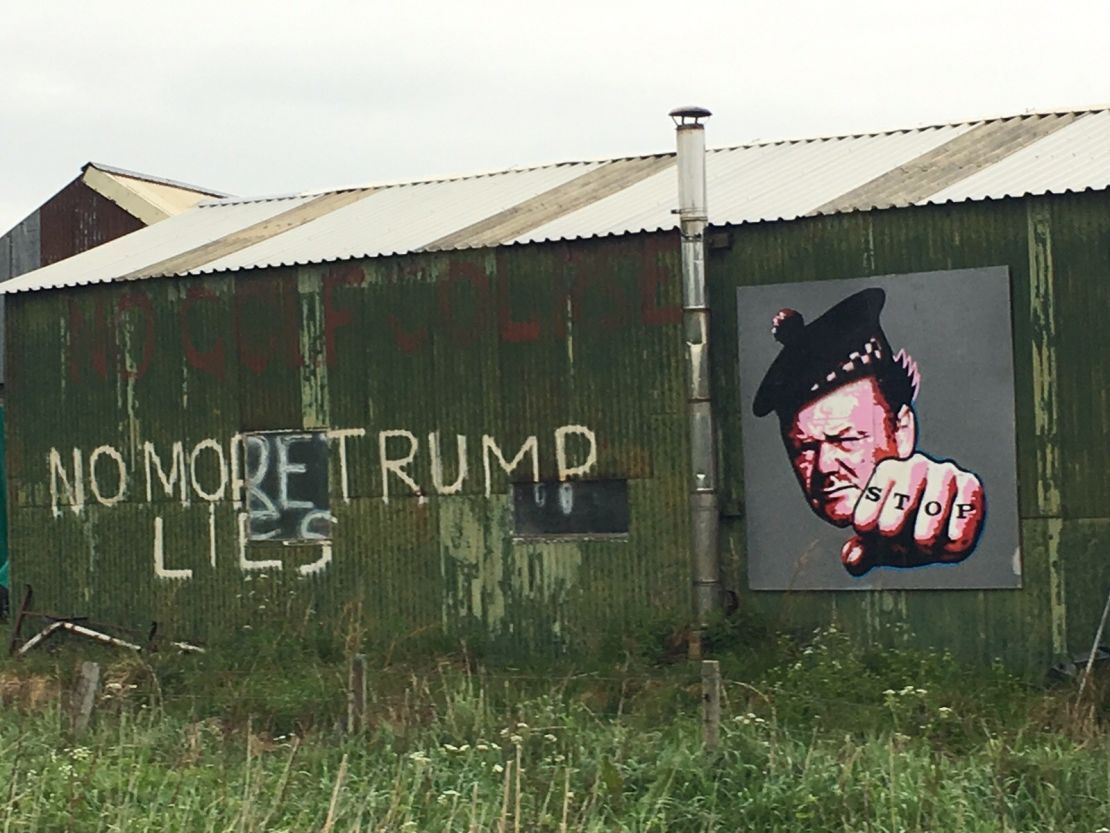Editor’s Note: Nic Robertson is CNN’s international diplomatic editor. The opinions in this article belong to the author.
Donald Trump’s decision to withdraw the United States from the Paris climate deal will have come as no surprise in Scotland.
Before becoming President, Trump fought a long battle with the Scottish government over 11 wind turbines.
The “green energy” wind farm was to be built just off the coast from his newly acquired Trump International Golf Links.
So bitter was Trump’s opposition to the plan, his attorneys took the case to court. Trump even gave testimony at a government hearing, decrying the environment-friendly project as bad for his investment in the golf course:
“I’ve spent a tremendous amount of money, debt-free, no debt on the property, nothing, building what many are already considering to be the greatest golf course anywhere in the world. I don’t want to see it destroyed by having 11 monstrosities built, looming over it.”
As Trump’s refusal to sign up for the Paris Agreement on climate change became clear last weekend at the G7 summit in Sicily, his chief economic adviser, Gary Cohn, struggled to convince reporters of his boss’ environmental bona fides, saying:

“He reiterated his views on the environment – he did, quote, say, ‘The environment is very, very important to me, Donald Trump. I care a lot about the environment.’ He talked about environmental awards that he has received in the past so he didn’t want anyone to think that he didn’t care about the environment. He very much cares about the environment.”
In the villages around Trump’s Aberdeenshire golf complex, folks remember not an entrepreneur who brought much needed jobs to the area but a bully who not only fell short of his lofty employment ambitions, but carved out his fairways and bunkers in a rare and environmentally unique area of sand dunes that have for millenniums been slowly shifting along the coast, molding and migrating with the changing seasons and wind.
So bad was his falling out with the locals, Trump wrote 16 increasingly angry letters to Scotland’s then-first minister, the famed Scottish Nationalist Alex Salmond, whom Trump had at one time befriended.
On April 19, 2012, in letter No. 8, Trump declares: “Your economy will become a third world wasteland that global investors will avoid. … I love Scotland and only have its best interests at heart.”
His 10th letter to Salmond on May 2, 2012, exposes the heart of Trump’s concerns again: Money is more valuable than the environment. “You are single-handedly destroying the economic well-being of a great country. … Your idea of independence is ‘Gone With the Wind.’ “
Trump tries every trick in the book to get his way, even invoking his long-dead mother, who was born hundreds of miles from the golf course, on the sodden, windblown Scottish Isle of Lewis: “I am doing this to save Scotland and (honor) my mother, Mary MacLeod, who as you know was born and raised in Stornoway. She would not believe what you are doing to her beloved Scotland.”
Now the same question is on Trump, only writ large on the planet.
While other world leaders from Edinburgh to Berlin, Beijing to Moscow and beyond have pledged their support for the climate change accord, America – a global leader per capita in carbon emissions – is distancing itself from the global mainstream.
The same evolution that created the sand for Trump’s golf bunkers, put fish in the sea and wheat in bread has delivered the planet to a moment of choice: change or risk destroying it all.
A few weeks ago in Milan, Italy, former President Barack Obama, who oversaw America’s backing for the Paris accord, laid out a stark view of the climate today: Seas are to rise by 3 feet, even if carbon cutting climate controls were enforced immediately. If nothing is done, then seas could rise by as much as 10 feet.
Most of the world’s population live on coasts, he warned. Mass migration for food will also become an issue, he told the crowd of government ministers, food and climate experts.
Obama’s message – control of our climate is not an option, it’s an imperative – left no room for doubt. If there were any dissenters in the audience, they didn’t let it be known. Instead he was lauded as a leader who, despite his foreign policy failings on Syria and elsewhere, had delivered the single biggest contribution to global well-being by shifting to supporting the climate accord, adding the critical mass to make the agreement meaningful.
Over time, Trump’s reversal risks seeing Obama’s dire warnings realized. In the short term, it reinforces the growing fears of European leaders that trans-Atlantic ties are weakening. In the words of German Chancellor Angela Merkel, we must “fight for our own future ourselves.”
Trump’s decision will touch all our lives – and the lives of our children perhaps more profoundly than we can imagine. It won’t just change the weather but the global political order.
In his own words, in another of his numerous letters to Salmond, the Scottish leader, about the Aberdeenshire wind farm, Trump tries flattery to get his own way. “History has proven conclusively that the world’s greatest leaders have always been those who have been able to change their minds for the good. I will be your greatest cheerleader if you modify your stance.”
Where he stands today, Trump may want to reread some of his letters and reflect on how history will remember him.




